Illustration by Fintan O’Sullivan
We love to laugh. We laugh at funny videos of dogs, or we laugh at TV shows. We laugh at jokes and we laugh with, and at, our friends. We laugh when people fail, and we laugh when they succeed. Laughter is everywhere around us, and can be one of the purest expressions of emotion that we show.
But what happens when we start to laugh at the wrong things, like racist, homophobic, ableist, and anti-Semitic jokes? It’s easy to do, and often it’s a lot easier to simply laugh than actually think about what we’re laughing at. Yet there has to be a point where something in our brain clicks and we say, “stop, that’s too far”… or at least there should be. Many people have this point, or this trigger, but how many really act on it?
It is hard to call people out when that line is crossed, especially if we don’t really know the person saying it. That being said, if we don’t call people out when saying these sorts of things, we are allowing these actions, making us no better than the perpetrator themself.
“I was just kidding man,” “I have black friends. They don’t care if I say that,” and “Dude, you know I would never actually say that in front of someone with a disability, calm down.” These are real excuses that I have personally heard Berkeley High School (BHS) students use to justify the jokes that they make.
There is always going to be that family member or friend that makes this unacceptable type of joke, and it genuinely does not make them a horrible person. But more than half the time it means they aren’t thinking about their actions and what they are saying. Recent events at BHS offer a great example of this, in reference to the racist, ableist, and anti-Semitic instagram account created by a BHS student.
At a Black Student Union meeting, I watched as this student, as well as others, express that they weren’t aware of the impact their jokes made on other people and how much pain they caused. Some may identify this as an excuse, which to a degree it was, but there is something very true and important to be taken away from it.
It’s not like these students, or any others that make discriminatory jokes, woke up one day and decided to say the things that they do. No, it’s normalized and becomes less and less powerful as time goes on, because no one is stopping them from inflicting pain with their jokes. As hard as it is to realize, the people responsible aren’t the ones making the jokes. It’s the ones who sit there knowing that what is being said is wrong and don’t do a single thing about it. Change won’t come until you take a stand, so speak up.


